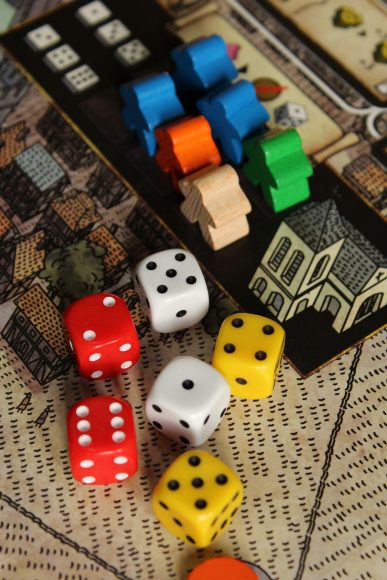We play a lot of games in our house — mostly board and card games. I’ve written about some of our favorites before. Recently, I watched a debate unfold on social media about whether parents should let their kids win games. The debate went something like this:
Perspective 1: You should let your kids win because it builds up confidence and self-esteem and teaches them that they can succeed at difficult tasks.
Perspective 2: You should not let your kids win because that’s not how life works, and losing teaches them good sportsmanship and how to accept failure.
I can see both sides of the debate as it’s framed here, but I also found myself kind of puzzled by the approach because I think we’re asking ourselves the wrong question. The question shouldn’t be, “Should I let my kid win at this game?” The question should be “Is this game being played equitably?”
Let me explain.
We Aim for Equitable Gaming
I have lots of goals for playing games with my kids. Here are some of them:
- Fun– Games are a source of entertainment, and we love using them that way.
- Bonding– Games are a way to spend time together that’s meaningful and full of chances to connect, talk, and make memories.
- Education– I’m a homeschooling mom, so I use several games for specific educational goals, and almost any game helps teach communication, critical thinking, and problem-solving skills.

With those goals in mind, anytime I pull out a game, I’m examining it for equity. What does that mean? Here’s a reflection on the term from the Stanford Social Innovation Review:
“It is about each of us getting what we need to survive or succeed—access to opportunity, networks, resources, and supports—based on where we are and where we want to go.”
What does that have to do with playing board games with my kids? Well … a lot, actually.
I think that board games offer me an opportunity to show my kids that I respect them, their abilities, and their efforts. If I just let them win games when we play, I’m not showing them that respect. I’m actually sending the opposite message: “I don’t believe in your abilities. You can’t do this.”
If that’s the case — I truly believe my child cannot succeed at the game using their own skills — then we probably shouldn’t be playing the game together. It’s not really an equitable situation.
But wait! You may be saying, How are kids ever supposed to learn how to play complex games, then?
That’s a valid point, and it’s another one that I think can best be addressed by considering equity. If a game can’t be played equitably, then it needs to be modified until it can be.
Modifications for Equitable Gameplay
Modifications help us make sure that everyone — from adults to preschoolers — is having fun and feeling capable.

You probably already use a lot of these strategies even if you don’t think about them in terms of equity. Here are our favorite ways to make sure that games work for our whole family:
- Choose Cooperative Play– Cooperative games are ones where you win or lose as a team, and you get to pool your resources and thinking. It can be a great way to make sure everyone gets to contribute based on their own abilities, and it allows even very young kids to play some seriously complex games and feel good about doing it.
- Adapt Competitive Games into Cooperative Ones– My kindergartner is a pro at this. He loves cooperative play and gets stressed out with competitive options, but he wants to play more of the games on our shelves. Together, we’ve found out that a lot of games can be adapted to be cooperative instead of competitive.
- Make Modified Rules for Younger Players– Stop and think about what the advantages and disadvantages of the particular game are. Then consider how you can give more disadvantages to older/more advanced players and more advantages to younger/less advanced players. This might mean that the more advanced player starts with more cards in a game where the goal is to get rid of them all. It might mean the younger player gets more “enhancements” or “charms” in a game where those offer special powers. Often, games are designed with elements of balance that you can intentionally alter to create balance in your own play.
- Model and Reveal Your Own Strategy– A lot of games are rooted in secrecy. You hide your cards. You do your planning in your head. You don’t let your opponent know what you have up your sleeve (though hopefully not literally up your sleeve — no cheating!) If you make much of this thinking and planning visible, you can both build up more equitable gameplay and teach your kids to be better players in one fell swoop. By playing with open hands (where everyone can see the cards) and narrating your plans aloud, you’re modeling the kind of thinking and strategy that will give your young player the skills to beat you … eventually without any help at all!
Playing games is one of our favorite ways to bond and spend time together, and thinking about strategies for more equitable gameplay has made it much more enjoyable for all of us. I never “let” my kids win, but I do give them the tools to beat me.










